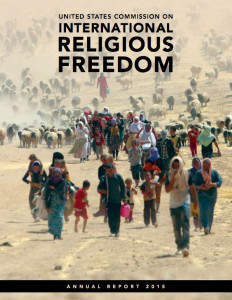
US: Stop Using Religion as an Excuse To Interfere in China’s Internal Affairs!
For years now, the United States has used the "Report on International Religious Freedom" as a vehicle by which to attack China, and if this latest U.S. effort to nose its way into Chinese affairs is anything to go by, it would seem that bad habits die hard. In three consecutive years from 2011 to 2013, the aforementioned report spun the Chinese government's lawful actions in religious administration and maintaining stability in Tibet, Xinjiang, and other regions as the "repression" of religious freedom. The 2014 report sings the same old tune, smearing the Chinese government as one that is repressing ethnic minorities and religious movements, with the news again claiming that the Chinese government has tightened restrictions on these groups under the veil of attacking the "three evils."
The facts of the matter are that the March 14, 2008 incident in Tibet and the Xinjiang incident on July 5, 2009 were both cases of external terrorists and separatists colluding within China to commit violent criminal acts, acts that caused staggering losses of life and property. The crimes against society perpetrated by cult organizations such as Falun Gong are even more countless. That the Chinese government should adopt reasonable and lawful measures to maintain the sovereignty, security and societal stability of the nation and protect its people's lives and assets is well within the bounds of legality, suitability and reason, and is a point beyond questioning. The United States taking China's entirely sensible and lawful actions and distorting them to be the repression and persecution of free religious activity is a denigration that turns right and wrong upon its head, and could not be further divorced from objective reason. Such action by the U.S. is driven by no other motive than to use religion as an excuse to meddle in China's "household affairs" in the hope of fishing out political benefits for itself.
It must be noted that the United States has always fancied itself as occupying the "moral high ground," and its pontificating from on high over the internal affairs of other countries has long since earned the distaste of the international community. If the United States continues to playact as "the world's religion police," it will only further expose its own wayward ambitions and deepen its estrangement with the rest of the international community. As mutual reliance between nations deepens daily in this globalized day and age, stirrings of instability within China due to religious issues should not come as glad tidings to any state anywhere in the world. One hopes that the United States is able to achieve a marriage of both word and deed, and cease these senseless actions that benefit neither itself nor others.
Since the founding of the new China, the nation has begun actualizing a policy of freedom of religion and belief, treating this freedom as a fundamental right of its citizens, and adding in protections from the constitution and legislation, achievements in developing religious affairs that are clear for all to see. The United States and China may differ to some degree in their methods and forms of expression when it comes to protecting freedom of religion and belief, but this should be no impediment to the two nations respecting each other, finding common ground, strengthening dialogue, and seeking progress together. President Xi Jinping's trip to the United States was a resounding success, and as the two nations reached a consensus on the establishment of a new model of great power relations, mutual understanding and respect will be both a prerequisite and guarantee for the realization of such a grand concept. The United States should cast aside political prejudices, fulfill its promises with real action, and do more in practice to foster U.S.-China relations.

